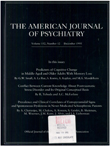Missed psychiatric appointments: who returns and who stays away
Abstract
OBJECTIVE: This study investigated reasons for missed psychiatric appointments, rescheduling of appointments, adverse outcomes, and the association of specific diagnoses and treatments with missed appointments. METHOD: A prospective survey covering all individual outpatient visits to seven mental health clinic psychiatrists was conducted during a 3-month period in 1991. Of the 1,620 scheduled visits, 142 (8.8%) were missed, representing 130 separate patients. For each missed appointment, the psychiatrist involved completed a questionnaire on the type of visit, the patient's DSM-III-R diagnosis, the reason for missing the appointment, the date of patient recontact, and adverse outcome, if any. RESULTS: Of the 142 missed appointments, 71.1% were rescheduled spontaneously by the patients; of these, most (73.3%) were rescheduled within 2 weeks. The remaining missed appointments represented various outcomes, including dropping out of treatment. The most common stated reason for missing an appointment was patient error, such as forgetting, oversleeping, or getting the date wrong. Patients with PTSD and/or substance abuse were significantly more likely than others to miss appointments, and those with major depression were somewhat less likely to do so. CONCLUSIONS: Most patients quickly reschedule missed appointments, and those in more intensive treatments miss fewer appointments. Missed appointments for initial evaluation are not rescheduled most often. Patients in ongoing treatment who do not return may have histories of noncompliance with treatment. The high rate of rescheduling suggests that follow-up of patients who miss appointments should be a clinical decision rather than a routine policy.
Access content
To read the fulltext, please use one of the options below to sign in or purchase access.- Personal login
- Institutional Login
- Sign in via OpenAthens
- Register for access
-
Please login/register if you wish to pair your device and check access availability.
Not a subscriber?
PsychiatryOnline subscription options offer access to the DSM-5 library, books, journals, CME, and patient resources. This all-in-one virtual library provides psychiatrists and mental health professionals with key resources for diagnosis, treatment, research, and professional development.
Need more help? PsychiatryOnline Customer Service may be reached by emailing [email protected] or by calling 800-368-5777 (in the U.S.) or 703-907-7322 (outside the U.S.).



